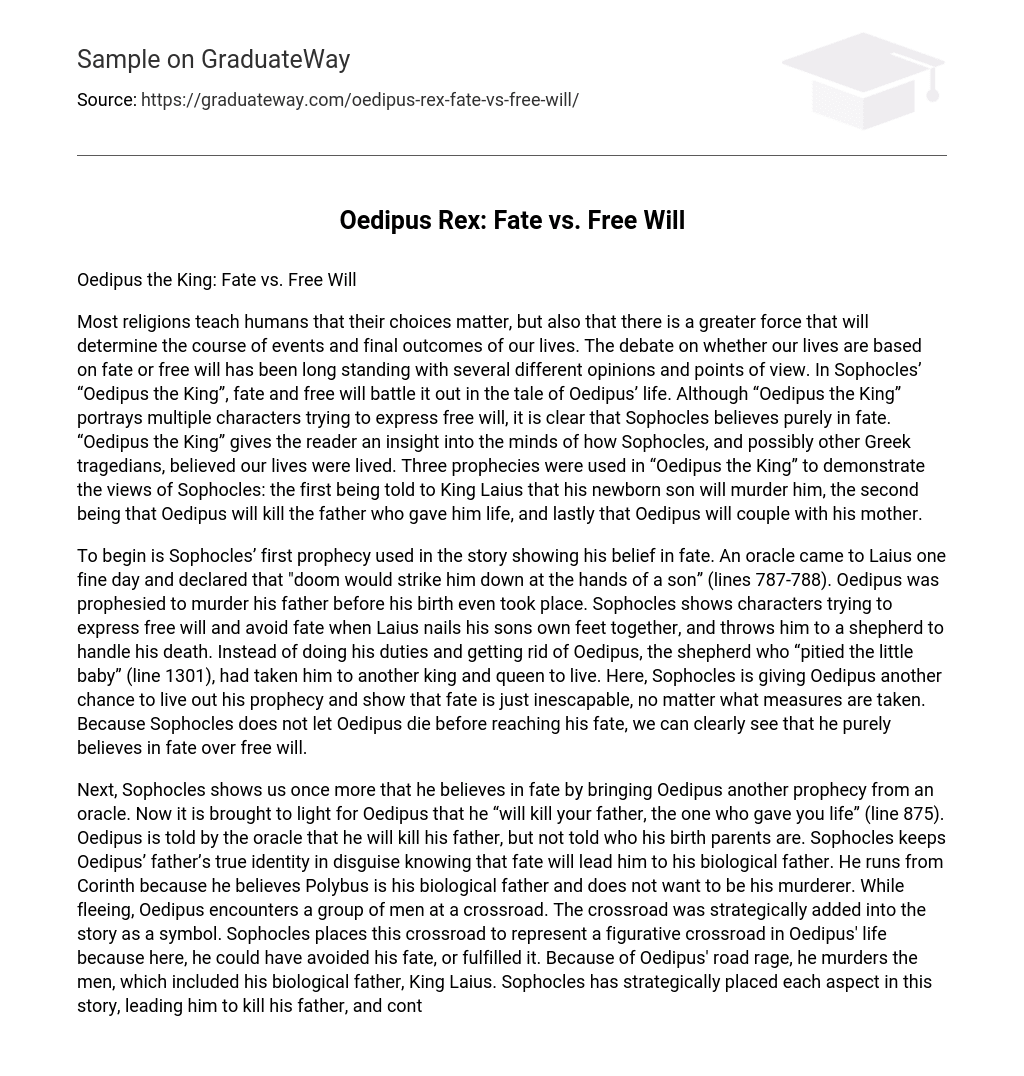Oedipus the King: Fate vs. Free Will
Most religions teach humans that their choices matter, but also that there is a greater force that will determine the course of events and final outcomes of our lives. The debate on whether our lives are based on fate or free will has been long standing with several different opinions and points of view. In Sophocles’ “Oedipus the King”, fate and free will battle it out in the tale of Oedipus’ life. Although “Oedipus the King” portrays multiple characters trying to express free will, it is clear that Sophocles believes purely in fate. “Oedipus the King” gives the reader an insight into the minds of how Sophocles, and possibly other Greek tragedians, believed our lives were lived. Three prophecies were used in “Oedipus the King” to demonstrate the views of Sophocles: the first being told to King Laius that his newborn son will murder him, the second being that Oedipus will kill the father who gave him life, and lastly that Oedipus will couple with his mother.
To begin is Sophocles’ first prophecy used in the story showing his belief in fate. An oracle came to Laius one fine day and declared that “doom would strike him down at the hands of a son” (lines 787-788). Oedipus was prophesied to murder his father before his birth even took place. Sophocles shows characters trying to express free will and avoid fate when Laius nails his sons own feet together, and throws him to a shepherd to handle his death. Instead of doing his duties and getting rid of Oedipus, the shepherd who “pitied the little baby” (line 1301), had taken him to another king and queen to live. Here, Sophocles is giving Oedipus another chance to live out his prophecy and show that fate is just inescapable, no matter what measures are taken. Because Sophocles does not let Oedipus die before reaching his fate, we can clearly see that he purely believes in fate over free will.
Next, Sophocles shows us once more that he believes in fate by bringing Oedipus another prophecy from an oracle. Now it is brought to light for Oedipus that he “will kill your father, the one who gave you life” (line 875). Oedipus is told by the oracle that he will kill his father, but not told who his birth parents are. Sophocles keeps Oedipus’ father’s true identity in disguise knowing that fate will lead him to his biological father. He runs from Corinth because he believes Polybus is his biological father and does not want to be his murderer. While fleeing, Oedipus encounters a group of men at a crossroad. The crossroad was strategically added into the story as a symbol. Sophocles places this crossroad to represent a figurative crossroad in Oedipus’ life because here, he could have avoided his fate, or fulfilled it. Because of Oedipus’ road rage, he murders the men, which included his biological father, King Laius. Sophocles has strategically placed each aspect in this story, leading him to kill his father, and continue down his path to his terrible fate.
Furthermore, is the final prophecy Sophocles uses to prove his belief in fate. Shortly after killing Laius, Oedipus arrives in Thebes while a horrifying sphinx terrorizes the town. Oedipus destroys the Sphinx by solving its riddle. Because he saves the town, he is rewarded with the crown of Thebes and taking the hand of the queen, Jocasta, in marriage. Oedipus is told he will “couple with your mother, you will bring a breed of children into the light no man can bear to see” (line 873-875). Unknown to Oedipus, he has become the “brother and father both to the children he embraces, to his mother, son and husband both” (lines 520-523). After both Oedipus and Jocasta disrespect fate by believing they had avoided the damning prophecies, Sophocles drops their downfalls upon them. Oedipus eventually realizes the prophecies dooming his life have come true. Jocasta becomes delusional which leads to her committing suicide and Oedipus gouges his eyes out, which represents the blindness of his choices throughout the play because of his arrogance and hubris. He is then exiled from Thebes, and has to live with his horrid life, while blindly walking the Earth. Sophocles uses what seems to be Oedipus’ biggest triumph, to lead him to his damning fate.
To conclude, Oedipus is presented with a series of choices throughout the play. His arrogant and stubborn nature push him to impulsively make the wrong decisions; the decisions that ultimately lead him to his fate. Although “Oedipus the King” portrays multiple characters trying to express free will, it is clear that Sophocles believes purely in fate. By the end of the play, two facts remain: Oedipus’ downfall is prophesied, and Oedipus does indeed fulfill the prophecies. Three prophecies, all fulfilled to destroy the life of the legendary King Oedipus, showing that even a “man beyond all power” (line 1682), can reach his fate. To the ancient Greeks, it was a moral point of view to remain within the limits of the Gods, but to the modern reader, it may seem terrifying to think that no matter what choices people make, they have a one track life; a life governed by something other than yourself. According to Sophocles himself, “Man cannot, and should not cross the boundaries set by the Gods. Man also cannot overcome the power of the will of the Gods”, a statement leaving the reader to believe his daily decisions may be obsolete.





